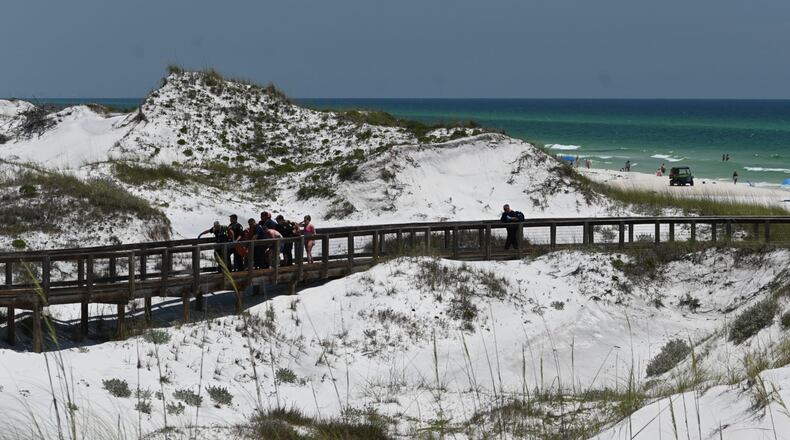Two teenagers and a 45-year-old woman were bitten in shark attacks in the Florida Panhandle within two hours of each other, officials said.
In two separate incidents Friday, a woman lost her lower arm and a teen girl was hospitalized in critical condition, South Walton Fire District Chief Ryan Crawford said at a news conference.
The attacks happened about 4 miles apart near Inlet Beach, officials said.
At around 1:20 p.m., a woman and her husband were swimming beyond a sandbar when she was attacked, Crawford said. She suffered “significant trauma” to her torso, and the lower part of her left arm was amputated, officials said.
Bystanders on the beach who had medical training rushed to help the woman before emergency personnel arrived, according to Walton County Sheriff Michael Adkinson.
County officials didn’t even have time to implement a no-swimming order at the beach before the second attack happened, the sheriff said.
Just before 3 p.m., two girls between ages 15 and 17 years were in waist-deep water with friends when they were attacked, according to the fire chief.
One girl had two significant wounds to her upper and lower body that required tourniquets before she was flown to a hospital, Crawford said.
The other girl had “flesh wounds” and is in stable condition.
“Marine life is out there, that’s their environment,” Crawford said. “And when you go into their environment, unfortunately as rare as these things are, these things can happen.”
He added it’s “extremely unusual” for two of these incidents to happen so close to each other. County officials reached out to experts to determine what, if anything in particular, has caused the recent attacks.
Double red flags are flying at Walton County beaches prohibiting swimmers from entering the water.
Shark attack facts
Shark attacks are “extremely rare,” according to John Carlson of the National Oceanic and Atmospheric Administration.
“You have a better chance of getting in a car accident and being injured on your way to the beach than you do actually when you get to go swimming,” he said in a video posted to NOAA’s website.
In 2023, the Florida Museum of Natural History’s International Shark Attack File investigated 120 shark-human interactions worldwide. Of those interactions, 69 were unprovoked shark bites, and there were 14 “shark-related fatalities.”
If you see a shark in the water, however, don’t panic, Richard Peirce, former chair of the Shark Trust and Shark Conservation Society, told CNN.
“Don’t start splashing around — you’re just going to excite, incite and encourage the shark’s interest,” he told the news outlet.
Instead, maintain eye contact with the shark and read its body language. If the shark appears to be in “attack mode,” you should make yourself as large as possible, CNN reported. If it seems to just be swimming by, try to stay small.
If the shark attacks, experts told CNN you shouldn’t play dead.
“You must try and keep the animal in sight and very slowly and gently try and swim backwards and get into shallow water,” Peirce told CNN. “Again, you’ve got to be careful — large sharks can attack in very shallow depths.”
About the Author





